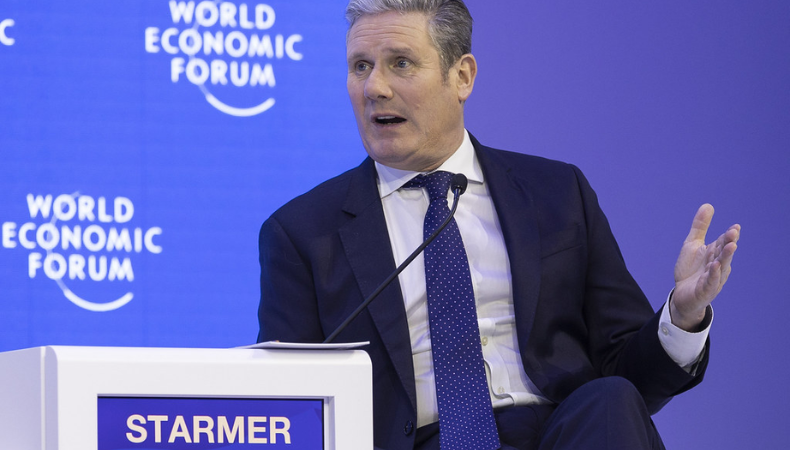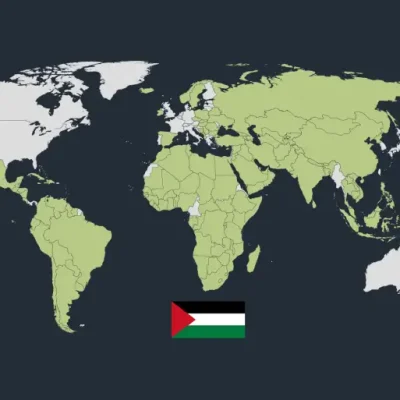Keir Starmer Affirms Palestinian State Recognition as ‘Undeniable Right’ in Middle East Peace Process

Emphasizing that the acceptance of the state of Palestine is a “undeniable right” under the framework of a Middle East peace process, the recently appointed Prime Minister of the United Kingdom, Keir Starmer, has underlined In a major change for UK foreign policy, Starmer underlined to Israeli Prime Minister Benjamin Netanyahu the “clear and urgent” necessity for a ceasefire, therefore promoting peace in the area actively.
Promote Palestine via Dedication to Peace
Starmer conveyed great sadness for the “ongoering suffering and devastating loss of life” in Gaza in his conversations with Palestinian President Mahmoud Abbas. This discussion tracked Labour’s election promise to acknowledge a Palestinian state as part of a two-state solution alongside Israel. According to a Downing Street official, the Prime Minister told President Abbas clear priorities including guaranteeing a truce, guaranteeing the release of captives, and boosting and quickening humanitarian relief and financial support for the Palestinian Authority.
Direct Engagement of Starmer with Netanyahu
Starmer reaffirmed his sympathies for the terrible death toll resulting from the October assaults during his conversation with Netanyahu. He underlined the urgent need of a ceasefire, liberation of hostages, and quick rise in civilian humanitarian aid. Starmer also underlined the need of creating long-term conditions for a two-state solution to guarantee the Palestinian Authority’s financial capability to operate as it should. Stressing the need of caution from all sides, he also highlighted the worrisome situation on Israel’s northern border where exchanges with Hezbollah based in Lebanon have been continuous.
Labour’s stance and electoral fallout
Labour’s position on Gaza has been divisive; its initial denial to demand a rapid ceasefire affected its support among Muslim populations. This was especially clear in the most recent general election, when Labour had to contend with pro-Gaza contenders. Supported by former Labour leader Jeremy Corbyn, independent candidate Shockat Adam toppled frontbencher Jonathan Ashworth in Leicester South. The voters responded well to Adam’s campaign, which concentrated on calling for an instant ceasefire in Gaza and denouncing Israel’s acts as “genocide”.
David Lammy’s Diplomatic Projects
David Lammy, the recently appointed Foreign Minister, reiterated Britain’s dedication to a sensible approach to the Middle East crisis in line with the posture of the Prime Minister. Lammy, speaking from Berlin on his first foreign trip following Labour’s election triumph, underlined the need of a truce and the release of Hamas’ hostages. He underlined Britain’s aim to change its worldwide stance on important concerns including the environment catastrophe and relations with European and developing countries. Lammy’s later trips to Sweden and Poland concentrated on talks on NATO alliance and the war in Ukraine.
The Humanitarian Crisis Gaza
Gaza health officials estimate that the fighting, which started in response to an attack on Israel headed by Hamas on October 7, has claimed over 38,000 Palestinian lives. The humanitarian situation emphasizes how urgently world engagement and support are needed to reduce citizen suffering. Lammy underlined the need of transcending the Brexit years and the possibility for a security agreement between the UK and the EU to improve collaboration.
Future Vision of Starmer
Calls for an instant ceasefire and acknowledgement of Palestine by Keir Starmer point to a radical change in UK Middle East policy. The UK government wants to provide security and peace in the area by tackling the humanitarian issue and backing a two-state solution. Seeking to combine the UK’s diplomatic engagements with justice and peace, Starmer’s leadership shows a fresh dedication to human rights and international law.
Prospects and Challenges Ahead
The difficulties to long-lasting peace remain significant as the UK negotiates its position in the Middle East. The political and historical complexity of the struggle call for a deliberate and uncompromising attitude. To create consensus and forward significant peace projects, Starmer’s government will have to interact with many parties, including foreign partners. Important first steps are the acceptance of Palestine and the need for a ceasefire; but, the road ahead will need constant diplomatic work and relentless dedication to justice and peace.
Keep on Reading
More General Consequences for UK foreign policy
The UK’s foreign policy and international reputation will be much changed depending on its position on the Middle East issue. Allies and enemies alike will keenly monitor the nation’s stance to the Israel-Palestine problem as it tries to rethink its worldwide ties following Brexit. Navigating these difficult geopolitical waters successfully will be evidence of the diplomatic acumen of the UK and its dedication to respect of international standards and human rights.
Finally, Keir Starmer’s latest remarks and actions on the acceptance of Palestine and the pressing need of a ceasefire expose a turning point in UK foreign policy. The UK wants to help to create peace and stability in the Middle East by tackling the humanitarian situation and supporting a two-state solution. Though the road forward will be difficult, committed leadership and international cooperation give promise for a more fair and peaceful future in the area.








